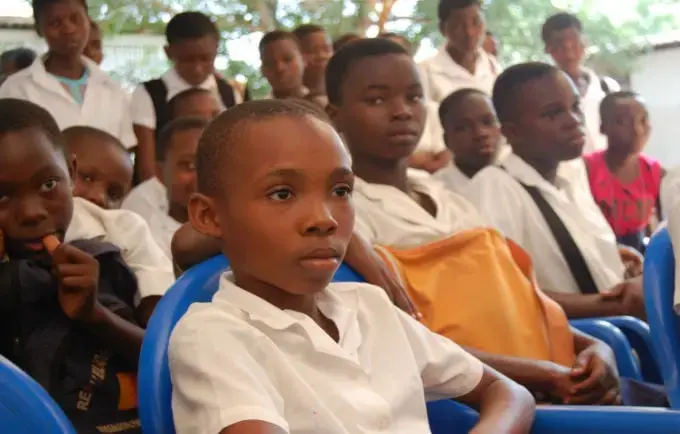Abuja, Nigeria– At a ceremony in the Nigerian Capital State House, UNFPA, the United Nations Population Fund, and UNICEF launched on 9 February 2016 their joint programme on the abandonment of Female Genital Mutilation/Cutting (FGM/C) in Nigeria. The programme is a national response to the high prevalent rate of FGM in the country. It was launched in Abuja in partnership with the Office of the First Lady, the Federal ministries of Health, Women affairs and Social development.

“I hear the cry of a little girl, she cries from the pain afflicted on her, she cried yesterday, cries today and may cry tomorrow, will you help me stop the pain?”, said Mrs. Dolapo Osinbajo, the wife of the Vice President of the Republic of Nigeria giving a collective call for everyone to join the campaign to end FGM in Nigeria. Representing Mrs. Aisha Muhammadu Buhari, the First Lady, she said “I urge the wives of Governors particularly those from states where this harmful practice is rampant to be the voice of the campaign to end FGM in their various States. We have the primary role to use our privileged positions to make lives better for Nigerians (especially women and girls). I urge you to be vocal on the need for FGM to end in Nigeria - within this generation - and take action that will enable this to happen”.
25 per cent Nigerian women have undergone FGM
FGM is widely practiced in Nigeria, where an estimated 19.9 million Nigerian women representing 25 per cent of women in Nigeria have undergone the procedure, according to the National Demographic Health Survey 2013.
FGM is widely practiced in Nigeria, where an estimated 19.9 million Nigerian women representing 25 per cent of women in Nigeria have undergone the procedure, according to the National Demographic Health Survey 2013.
Besides, it is an extremely harmful traditional practice, documented in 28 countries in Africa, Asia and the Middle East. It comprises all procedures involving partial or total removal of the external female genitalia or other injury to the female genital organs for non-medical reasons. Little is known about the origin of the practice, which predates contemporary world religions.
“It is a violation of women’s reproductive rights, one that destroys her bodily integrity, perpetuated and inflicted by other women” said Mrs. Toyin Saraki, the wife of the Senate President, “It is time for us women, to think of how we can be better sisters, aunties, mothers or friends to others who are about to be victims”, she added.
“Enough is enough”, noted Ratidzai Ndhlovu, the UNFPA representative, “our young girls have suffered enough from this barbaric act”.
Although the practice is slowly declining, a few of the myths that perpetuate the practice are ideas that FGM prevents young women from becoming promiscuous or that it promotes the marriageability and fertility of the woman.
“Not one of the myths surrounding this practice has any basis in truth,” said Jean Gough, the UNICEF Representative, “the only truth is that on every level this is a harmful and brutal practice that has a detrimental impact on the health of women and girls.”
Cecelia a 20 year old survivor almost bled to death when her clitoris was cut at the age of 18. Recounting her story at the launch of the national response, she narrated how she was tricked by her mother to visit the village. Upon her arrival, she was taken away by two strange women. On dirt floor, her legs were spread apart and tied to a tree, while a heavy woman sat on her chest. She was restrained but she struggled notwithstanding till she was cut. “The cut was too deep”, Cecelia recounted with a shaking voice. With sobbing eyes she looked at her mother and the only response she got was “you are now a woman”.
Efua Dorkenoo Pan African Award
On 6 February, on the occasion of International Day of Zero Tolerance for Female Genital Mutilation, UNFPA Executive Director, Dr. Babatunde Osotimehin, and UNICEF Executive Director, Anthony Lake, stated in a joint statement that “There simply is no place for FGM in the future we are striving to create – a future where every girl will grow up able to experience her inherent dignity, human rights and equality by 2030.”
In order to increase awareness and engagement on female genital mutilation (FGM) within African media outlets at the community, national and regional levels, The Guardian and UNFPA have created the Efua Dorkenoo Pan African Award for Reportage on Female Genital Mutilation.
The award was named after Efua Dorkenoo, a determined Ghanaian campaigner against FGM who fought for over 30 years to protect the health and human rights of girls and women. Diana Kendi Makale, a journalist from Kenya, was honored during the launch of UNFPA and UNICEF joint programme in Nigeria, as the first Efua Dorkenoo Pan African Award winner for her Reportage on Female Genital Mutilation.





